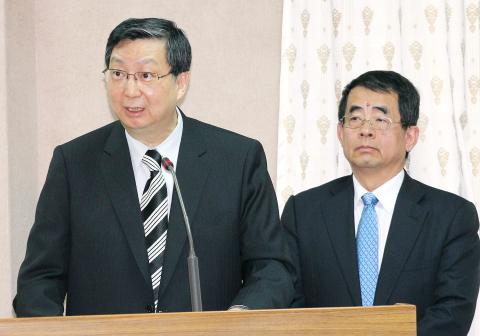Vice Minister of Economic Affairs Bill Cho (卓士昭) yesterday provided general information to lawmakers about the costs and benefits of a potential entry by Taiwan into the Trans-Pacific Partnership (TPP), drawing criticism about the government’s preparedness to steer the nation toward securing a seat in the emerging regional economic integration agreement.
Cho and Minister of Foreign Affairs David Lin (林永樂) attended a meeting of the legislature’s Foreign Affairs and National Defense Committee for discussion of the TPP issue.
Cho told Democratic Progressive Party (DPP) Legislator Chen Ou-po (陳歐珀) that agriculture was the sector that would be hit the hardest if Taiwan joins the TPP, with its production value estimated to fall by NT$72.77 billion (U$2.442 billion). President Ma Ying-jeou (馬英九) earlier this year said that Taiwan could join the TPP within eight years.

Photo: CNA
According to statistics from the Council of Agriculture, the output value of the agricultural sector stood at NT$475.52 billion in 2011.
Cho did not explain whether that loss was estimated on an annual basis or on a longer period.
Questioned later by other lawmakers who were eager to know the exact details of the estimates, Cho said he did not have comprehensive information at hand.
“By all accounts, the benefits of TPP membership outweigh the costs,” Cho said, basing his remarks on an impact assessment conducted by the Chung-Hua Institute for Economic Research (CIER).
CIER’s initial report showed that joining the TPP would increase the nation’s GDP by 1.46 percent and that the nation’s textile industry’s production value would increase by US$4.46 billion; that of the chemical, plastic and rubber products industry by US$2.023 billion; the leather garment and leather product industry by between US$1.2 billion and US$1.4 billion; and the services industry by US$11.562 billion, Cho said.
Cho said that CIER is expected to present a detailed assessment report in June.
Chinese Nationalist Party (KMT) Legislator Chen Pi-han (陳碧涵) demanded that the ministry present the committee with its analysis of how Taiwan’s entry into the TPP would affect agricultural jobs, cause reduced income for farmers and reduce the nation’s food self-sufficiency ratio, as well as the government’s response strategies.
DPP Legislator Hsiao Bi-khim (蕭美琴) urged the government to be more explicit about unresolved trade issues between Taiwan and its trading partners.
Hsiao said that the government needed to speak plainly to those who might be negatively affected by bilateral or multilateral free-trade agreements and discuss with them measures to help them adjust to trade liberalization.

Alain Robert, known as the "French Spider-Man," praised Alex Honnold as exceptionally well-prepared after the US climber completed a free solo ascent of Taipei 101 yesterday. Robert said Honnold's ascent of the 508m-tall skyscraper in just more than one-and-a-half hours without using safety ropes or equipment was a remarkable achievement. "This is my life," he said in an interview conducted in French, adding that he liked the feeling of being "on the edge of danger." The 63-year-old Frenchman climbed Taipei 101 using ropes in December 2004, taking about four hours to reach the top. On a one-to-10 scale of difficulty, Robert said Taipei 101

Nipah virus infection is to be officially listed as a category 5 notifiable infectious disease in Taiwan in March, while clinical treatment guidelines are being formulated, the Centers for Disease Control (CDC) said yesterday. With Nipah infections being reported in other countries and considering its relatively high fatality rate, the centers on Jan. 16 announced that it would be listed as a notifiable infectious disease to bolster the nation’s systematic early warning system and increase public awareness, the CDC said. Bangladesh reported four fatal cases last year in separate districts, with three linked to raw date palm sap consumption, CDC Epidemic Intelligence

Two Taiwanese prosecutors were questioned by Chinese security personnel at their hotel during a trip to China’s Henan Province this month, the Mainland Affairs Council (MAC) said yesterday. The officers had personal information on the prosecutors, including “when they were assigned to their posts, their work locations and job titles,” MAC Deputy Minister and spokesman Liang Wen-chieh (梁文傑) said. On top of asking about their agencies and positions, the officers also questioned the prosecutors about the Cross-Strait Joint Crime-Fighting and Judicial Mutual Assistance Agreement, a pact that serves as the framework for Taiwan-China cooperation on combating crime and providing judicial assistance, Liang

US climber Alex Honnold left Taiwan this morning a day after completing a free-solo ascent of Taipei 101, a feat that drew cheers from onlookers and gained widespread international attention. Honnold yesterday scaled the 101-story skyscraper without a rope or safety harness. The climb — the highest urban free-solo ascent ever attempted — took just more than 90 minutes and was streamed live on Netflix. It was covered by major international news outlets including CNN, the New York Times, the Guardian and the Wall Street Journal. As Honnold prepared to leave Taiwan today, he attracted a crowd when he and his wife, Sanni,